
Drying clothes on radiators is a common practice in many households, especially during the colder months. It may seem like a convenient and efficient way to dry your clothes, but did you know that it can actually be detrimental to your health and the condition of your home? In this article, we will explore the reasons why you should avoid drying clothes on radiators and suggest some alternative methods that are safer and more effective.
One of the main reasons why drying clothes on radiators is not recommended is because it can increase the humidity levels in your home. When clothes are hung on radiators, the water present in them evaporates and the moisture is released into the surrounding air. This can lead to a build-up of moisture and humidity, which can create an ideal environment for mold and mildew to grow. These can not only cause unpleasant odors and damage to your walls and furniture, but they can also have negative effects on your health, especially for those with respiratory conditions such as asthma.
Another issue with drying clothes on radiators is that it can affect the efficiency of your heating system. When you hang wet clothes on radiators, the heat produced by the radiator is absorbed by the clothes, making it harder for the radiator to effectively heat the room. This means that your heating system will have to work harder and consume more energy to keep the room warm, leading to higher energy bills. Additionally, the excessive moisture in the air can make the room feel damp and uncomfortable, defeating the purpose of having a heated home.
Fortunately, there are alternative methods that you can use to dry your clothes without resorting to radiators. One option is to invest in a clothes drying rack or clothesline. These allow you to hang your clothes to air dry in a well-ventilated area, such as a utility room or outdoors. This method not only prevents the increase in humidity levels, but it also helps to preserve the condition of your clothes. Another option is to use a tumble dryer, which can dry your clothes quickly and efficiently, although it may consume more energy.
In conclusion, drying clothes on radiators may seem like a convenient solution, but it can have detrimental effects on your health and your home. The increased humidity levels can lead to mold and mildew growth, while also affecting the efficiency of your heating system. By exploring alternative drying methods, you can ensure a healthier and more energy-efficient solution for drying your clothes.
Why Shouldn’t You Dry Clothes on Radiators?
Drying clothes on radiators may seem like a convenient and efficient way to speed up the drying process, especially during the colder months. However, there are several reasons why this method is not recommended.
1. Fire Hazard
Drying clothes on radiators can be a fire hazard. Radiators can become extremely hot when in use, and placing wet clothes directly on them can increase the risk of fire. The heat from the radiator can cause the fabric to ignite, leading to a potentially dangerous situation.
2. Damaged Radiators
Placing wet clothes on radiators can also cause damage to the radiators themselves. The excess moisture from the clothes can cause rusting or corrosion, which can ultimately lead to leaks or other malfunctions in the radiator system.
3. Inefficient Heating
Drying clothes on radiators can reduce the efficiency of your heating system. When clothes are placed on radiators, they obstruct the flow of hot air, preventing it from circulating properly throughout the room. This can result in uneven heating and wastage of energy, as the radiator will have to work harder to maintain the desired temperature.
Alternatives to Drying Clothes on Radiators

If you want to avoid the risks and drawbacks of drying clothes on radiators, here are some alternative methods you can consider:
- Outdoor drying: Utilize the natural drying power of the sun and wind by hanging your clothes outside on a clothesline or drying rack.
- Indoor drying rack: Invest in a drying rack specifically designed for drying clothes indoors. These racks are portable and can be easily set up in a spare room, laundry room, or even in the bathroom.
- Tumble dryer: If you have access to a tumble dryer, this can be a convenient and efficient way to dry your clothes quickly. Just make sure to follow the manufacturer’s guidelines for safe use.
By avoiding the practice of drying clothes on radiators, you can ensure the safety of your home, prolong the lifespan of your radiators, and optimize the efficiency of your heating system.
Safety Considerations
Risk of Fire
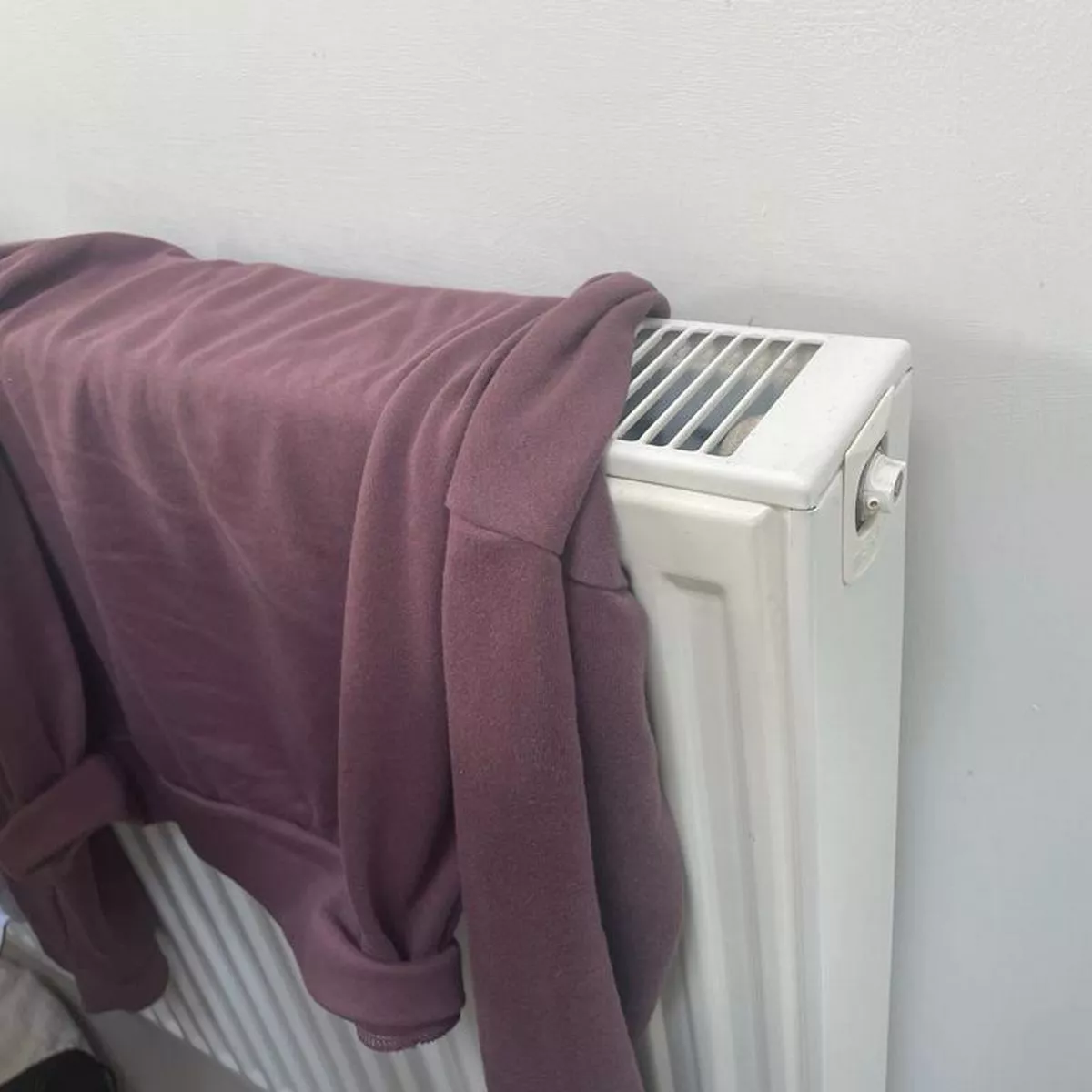
Drying clothes on radiators can pose a significant fire hazard. Radiators can reach high temperatures, especially when they are on for extended periods. Placing clothes directly on them increases the risk of them catching fire. The combination of heat and flammable materials can lead to a dangerous situation.
Blocked Heat Circulation
When clothes are draped over radiators, they can block the heat circulation. This can cause the radiator to overheat and potentially malfunction. Overheating radiators can lead to issues with the entire heating system, such as leaks or even exploding radiators.
Damp and Mold Growth
If clothes are not properly dried and there is not enough ventilation in the room, dampness can accumulate. This can create an environment that promotes the growth of mold and mildew. Breathing in mold spores can be harmful to your health, especially for those with respiratory conditions.
Electricity Danger
In some cases, radiators are connected to electrical systems. Placing wet clothes directly on these radiators can increase the risk of electrical hazards, including electrical shocks. Water and electricity should never mix for safety reasons.
Alternative Drying Methods
To avoid the risks associated with drying clothes on radiators, consider alternative methods:
- Use a clothes drying rack or clothesline to air dry clothes naturally.
- Utilize a tumble dryer, which is specifically designed for drying clothes quickly and efficiently.
- If you live in a small space, invest in a compact ventless dryer that doesn’t require a lot of room or external venting.
Conclusion
While it may be convenient to dry clothes on radiators, it is essential to consider the safety risks involved. From the potential for fires to mold growth and electrical dangers, it is best to explore alternative methods for drying clothes to ensure the well-being of both yourself and your home.
Energy Efficiency
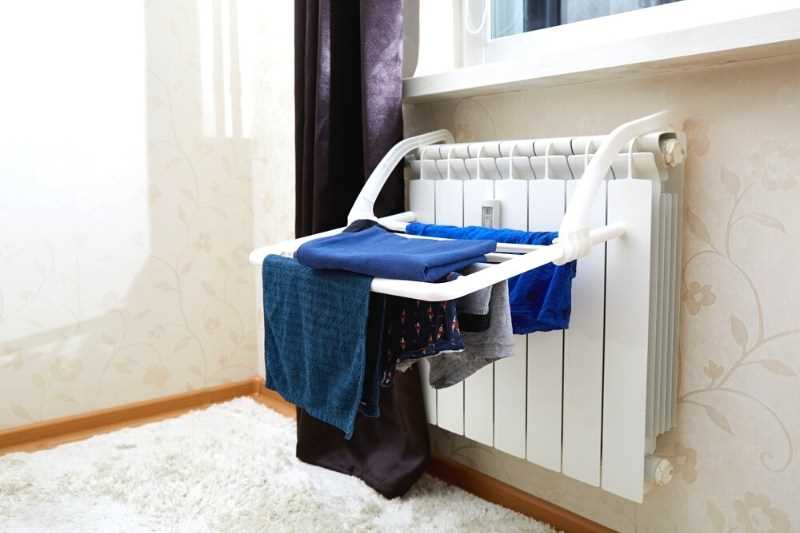
In addition to the potential damage to your clothes, drying clothes on radiators can also affect the energy efficiency of your home. Here are some reasons why you should avoid this practice:
Inefficient Heating
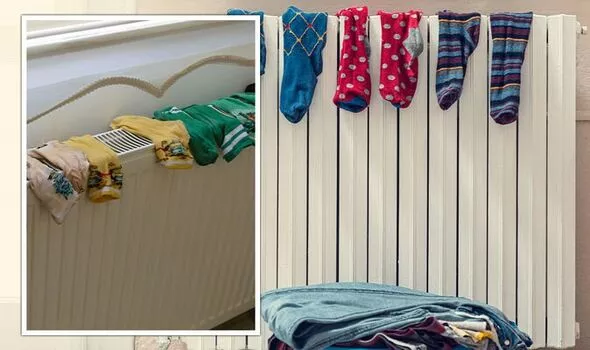
Radiators are designed to radiate heat into the room, warming up the surrounding air. When you hang wet clothes on radiators, it obstructs the flow of heat and prevents it from properly circulating, making your heating system less efficient. This can result in a higher energy consumption and increased utility bills.
Prolonged Heating Time
When wet clothes are placed on radiators, they add moisture to the air in the room. As a result, the relative humidity increases, making it more difficult for the room to reach its desired temperature. This means that the heating system will need to stay on for a longer period of time to compensate for the added moisture, further reducing energy efficiency.
Potential Mold Growth

Hanging wet clothes on radiators can create a damp environment, which is ideal for mold growth. Mold can damage the walls and furniture in your home, and it can also lead to health issues such as allergies and respiratory problems. To maintain a healthy and energy-efficient living space, it is important to prevent excess moisture and avoid drying clothes on radiators.
Alternatives for Drying Clothes
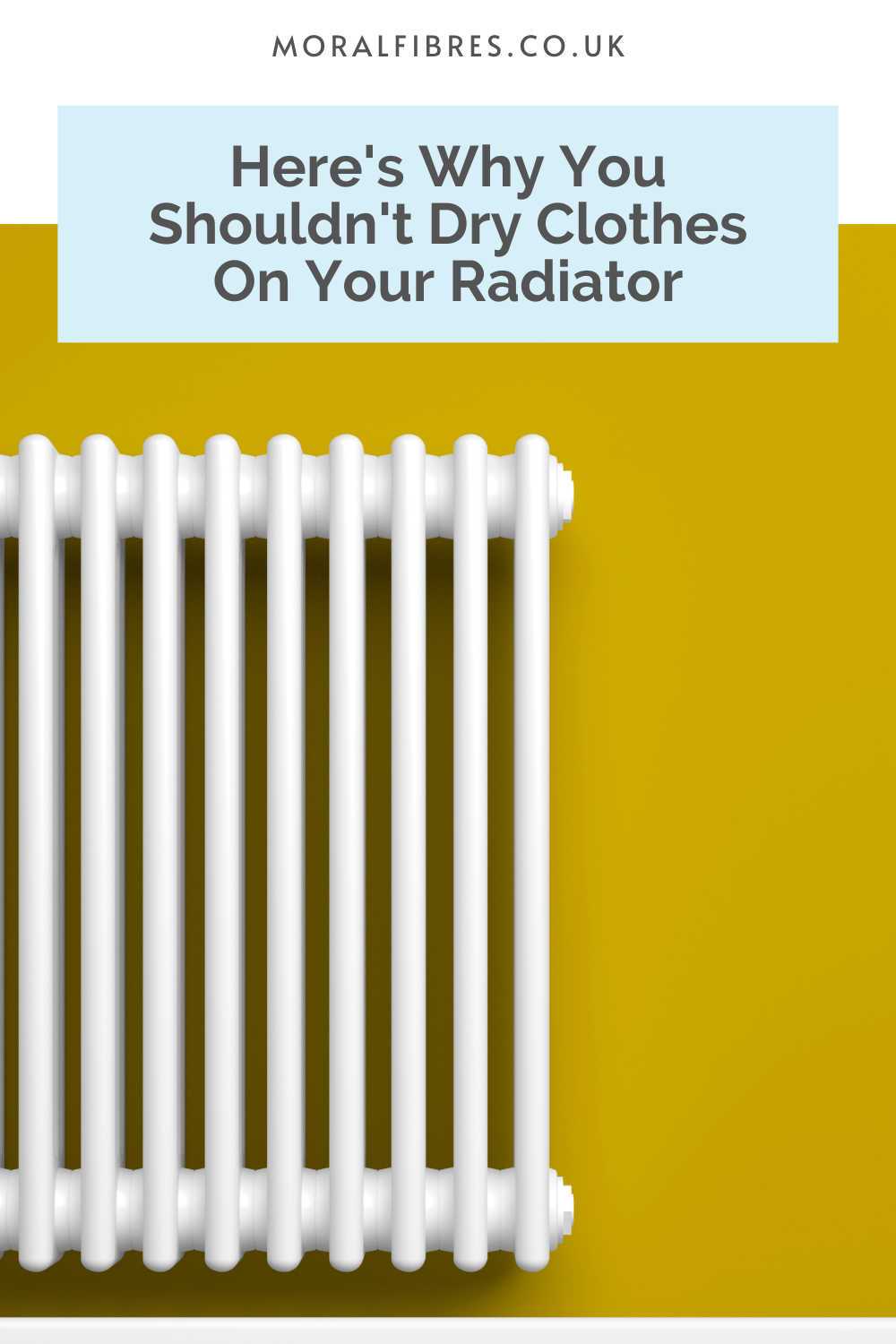
If you want to dry your clothes efficiently and save energy, there are several alternatives to consider:
- Use a clothesline or a drying rack: Hang your clothes outside on a clothesline or use an indoor drying rack. This allows for proper air circulation and eliminates the risk of damage to your clothes or your home.
- Use a tumble dryer: If you have access to a tumble dryer, this can be a convenient and energy-efficient option. Look for energy-saving models and always follow the manufacturer’s guidelines for optimal usage and efficiency.
- Choose the right time to do laundry: Take advantage of sunny and windy days to dry your clothes outside. The natural elements will do the drying for you, without any impact on your home’s energy efficiency.
By opting for these alternatives, you can ensure that your clothes are dried effectively and without compromising the energy efficiency of your home.
Effect on Indoor Air Quality
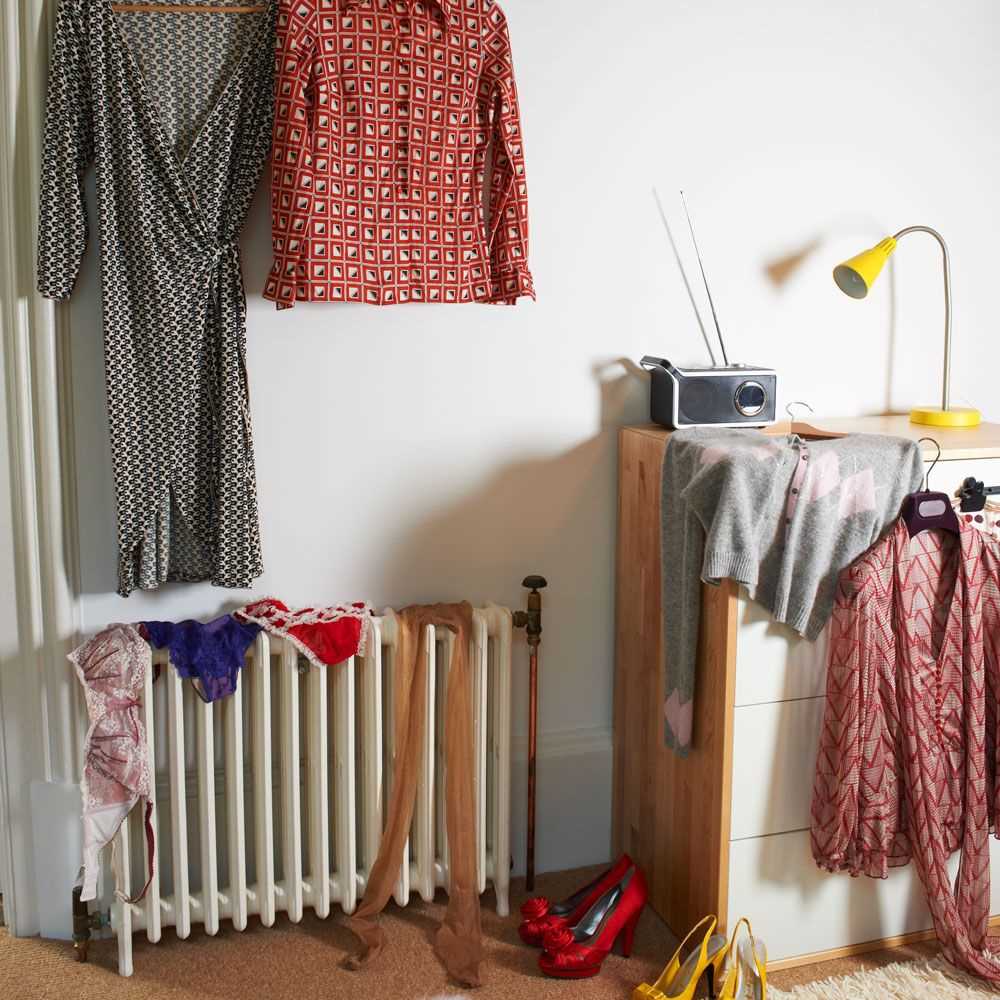
Drying clothes on radiators can have a negative impact on indoor air quality. When wet clothes are placed on radiators, the heat from the radiator causes the moisture in the clothes to evaporate. This increases the humidity level in the room, which can lead to a range of issues.
1. Mold and Mildew Growth: Excessive humidity provides the perfect environment for mold and mildew to grow. These fungi thrive in damp conditions and can release spores into the air that can cause allergies and respiratory problems.
2. Dampness and Condensation: High humidity levels can result in dampness and condensation on walls, windows, and other surfaces. This can lead to damage to paint, wallpaper, and woodwork, and can create an ideal breeding ground for dust mites.
3. Poor Indoor Air Quality: The increased moisture in the air from drying clothes on radiators can also trap dust, pollen, and other allergens, reducing the overall air quality in the room. This can lead to symptoms such as coughing, sneezing, and worsening of respiratory conditions.
4. Energy Consumption: Drying clothes on radiators can also impact energy consumption. When radiators are blocked by wet clothes, they become less efficient at heating the room, which can lead to increased energy usage and higher heating bills.
To maintain good indoor air quality, it is recommended to dry clothes in well-ventilated areas or using dedicated drying racks or clotheslines. This allows for proper airflow and prevents excessive moisture buildup in the home.
Potential Damage to Radiators
Drying clothes on radiators can cause potential damage to the radiators themselves. Here are some reasons why you shouldn’t dry clothes on radiators:
- Heat Damage: Radiators are designed to generate heat and warm up the surrounding area. When you hang wet clothes over a radiator, the heat can become trapped between the clothes and the radiator, causing the temperature to rise. This excessive heat can lead to damage to both the clothes and the radiator.
- Corrosion: Wet clothes contain moisture, which can condense on the surface of the radiator. Over time, this moisture can cause corrosion on the metal surface of the radiator. Corrosion weakens the metal and can eventually lead to leaks or even structural damage.
- Reduced Efficiency: When clothes are hung on radiators, they obstruct the airflow around the radiator. This impedes the natural convection process, which relies on the circulation of air to distribute heat evenly. As a result, the radiator’s efficiency is reduced, and it may take longer to heat up the room.
- Uneven Heating: Hanging clothes on radiators can also create hotspots on the radiator where the clothes are directly in contact with the metal. This can cause uneven heating, with some areas of the radiator becoming hotter than others. Uneven heating can put unnecessary strain on the radiator and potentially lead to damage over time.
To avoid the potential damage to radiators, it is recommended to use alternative methods for drying clothes, such as using a clothes rack or an indoor drying line. These options provide a safe and effective way to dry clothes without risking damage to your radiators.
Discover the Facts and Alternatives
Facts about drying clothes on radiators
- Drying clothes on radiators can lead to reduced energy efficiency.
- It can cause the radiator to work harder and result in higher energy bills.
- The moisture released from the wet clothes can increase the humidity levels in the room, leading to condensation and potential mold growth.
- It can also cause the radiator to rust or corrode over time.
- Drying clothes on radiators can obstruct the heat flow and reduce the overall effectiveness of the heating system.
Alternatives to drying clothes on radiators
If drying clothes on radiators is not recommended, here are some alternatives:
- Use a clothes drying rack or clothesline: Hang your wet clothes on a rack or clothesline indoors or outdoors to air dry naturally. This method is more energy-efficient and helps maintain the air quality in your home.
- Utilize a dedicated laundry room: If you have a laundry room, consider installing a clothes drying rack or clothesline in this space. It will provide a designated area for drying clothes and minimize the risk of condensation or mold formation in other areas of your home.
- Invest in a dehumidifier: If you live in a humid climate or have limited space for drying clothes, a dehumidifier can help reduce excess moisture in the air. By controlling the humidity levels, the drying process will be faster and prevent condensation issues.
- Use a tumble dryer: If you have access to a tumble dryer, it can be a convenient option for drying clothes quickly. However, keep in mind that tumble dryers consume electricity, so ensure you use energy-efficient models and follow the manufacturer’s guidelines for optimal performance.
- Hang clothes near a heat source: Instead of directly placing wet clothes on radiators, consider hanging them near a heat source, such as a radiator or heater, without obstructing the airflow. This indirect heat will help speed up the drying process without affecting the heating system’s efficiency.
By adopting these alternatives, you can avoid the downsides of drying clothes on radiators and maintain a more sustainable and energy-efficient home.
FAQ
Why shouldn’t I dry clothes on radiators?
Drying clothes on radiators can be inefficient and can even be a fire hazard. When clothes are hung on radiators, they block the heat from radiating into the room, which means that the heating system has to work harder to maintain a comfortable temperature. This can lead to higher energy bills. Additionally, hanging wet clothes on radiators can create excessive moisture in the air, which can encourage the growth of mold and mildew.
What are the alternatives to drying clothes on radiators?
There are several alternatives to drying clothes on radiators. One option is to use a clothes horse or drying rack. These are portable and can be placed in a well-ventilated area to allow clothes to air dry. Another option is to use a tumble dryer, if you have one. Tumble dryers use warm air to dry clothes quickly and efficiently. You could also consider hanging clothes outside on a washing line, weather permitting, or using a clothes dryer with a vent to the outside.
Can drying clothes on radiators be a fire hazard?
Yes, drying clothes on radiators can be a fire hazard. Radiators are not designed to hold the weight of wet laundry, and hanging clothes on them can cause them to become overloaded and potentially fall. Additionally, the heat from radiators can cause clothes to dry too quickly, which increases the risk of fire. It is always best to use alternative methods to dry clothes, such as a clothes horse or drying rack.
Does drying clothes on radiators increase my energy bills?
Yes, drying clothes on radiators can increase your energy bills. When clothes are hung on radiators, they block the heat from radiating into the room, which means that the heating system has to work harder to maintain a comfortable temperature. This can result in higher energy consumption and subsequently higher bills. Using alternative methods, such as a clothes horse or drying rack, can help to reduce energy usage and save money.
What are the risks of drying clothes on radiators?
Drying clothes on radiators can pose several risks. One risk is that the weight of wet laundry can cause radiators to become overloaded and potentially fall, leading to damage or injury. Another risk is that the heat from radiators can cause clothes to dry too quickly, increasing the risk of fire. Additionally, hanging wet clothes on radiators can create excessive moisture in the air, which can encourage the growth of mold and mildew. It is best to avoid drying clothes on radiators and use alternative methods to dry clothes safely.
Can I dry clothes on radiators?
It is not recommended to dry clothes on radiators. Although it may seem like a convenient and quick way to dry clothes, it can be harmful to your health and your home. Radiators are not designed to handle the moisture from wet clothes, and the excess moisture can lead to dampness, mold, and mildew in your home. Furthermore, drying clothes on radiators can also reduce the efficiency of your heating system and increase your energy bills.
What are the alternatives to drying clothes on radiators?
There are several alternatives to drying clothes on radiators. One option is to use a clothes drying rack or clothesline. These allow the air to circulate around the clothes, promoting faster drying. Another option is to use a tumble dryer, although this can be more expensive in terms of energy costs. If you live in a sunny climate, you can also take advantage of the natural sunlight by hanging your clothes outside to dry. Just make sure to check the weather forecast to avoid any unexpected rain showers!

![[2Pcs] ReFind Radiator Drying Rack. Towel & Clothes Radiator Airer For Space Saving & Energy Bill Reduction. 4 tier Radiator Clothes Drying Rack. Airers for laundry, Bedding (50x14.5x34.5cm)](https://m.media-amazon.com/images/I/410YdnVqJRL._SL160_.jpg)










